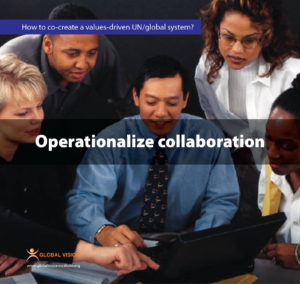Many participants note that the traditional default culture of the UN and the larger international system is one of siloes and divisions, especially along the lines of technical disciplines and organizational functions, and in the UN particularly between security, development, humanitarian action, and human rights.
The 2030 Agenda has gone a significant way towards acknowledging how the interplay among these must be incorporated into forging any useful solutions for sustainable development. The mindsets, culture and tools that allow for this shift however are only now being shaped. Participants point to the competitiveness wrought by scarce resources, and the drive to prove value by hoarding information. They also note the need for principled partnerships, including with the private sector.
Proposals for change include:
- Inter-disciplinary collaborative research that demonstrates how the different sectors are simultaneously experienced in a given context or for given subjects, how they are inter-connected, and thus how related problems can be meaningfully addressed
- Highlighting universal values that cut across sectors e.g. “leaving no one behind” in the 2030 Agenda, applying the Guiding Principles on business and human rights, and addressing tax avoidance/evasion in private sector engagement
- Openness and breaking down the walls and competitiveness through – sharing data, ensuring that different agency administrative systems are compatible e.g. UMOJA and ATLAS, ensuring a standard common recruitment process across all the UN bodies, streamlining governance bodies across UN entities, and reviewing mandates to avoid duplication, making One UN a reality
Is collaboration a buzz word or a practical reality in your organization?
